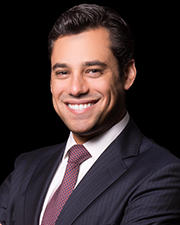Fordham Real Estate Institute, Dansker Capital Group host webinar, “A New Normal: Insiders Look at The State of The Market and What’s Next”

New York, NY On Tues., June 30th, the Fordham Real Estate Institute (REI) and Dansker Capital Group hosted a thought-provoking webinar that tackled the state of real estate in the city and where we go from here. Nearly 150 attendees participated in “A New Normal: Insiders Look at The State of The Market and What’s Next,” which served as the kick-off for an event series hosted by the two organizations.
The panel discussion, moderated by Andrew Dansker, founder and president of Dansker Capital Group and Fordham REI adjunct professor, featured some of the leading minds working in real estate today, including:
- Shimon Shkury, founder and president, Ariel Property Advisors
- Susan Baumel-Cornicello, partner, Cornicello, Tendler, Baumel-Cornicello, LLP
- Matt Engel, president, Langsam Property Services Group & chairman, CHIP
- Kirk Lloyd, senior lending officer, Dime Community Bank
“As I see it, New York City is facing at least five big problems all at once–the health crisis, a social justice crisis, a budget crisis, a recession and an urban livability crisis,” said Dansker in his opening remarks. “As an industry, real estate is facing its own series of issues: drastically altered consumer, work and life habits; a resulting sea change in revenue streams from tenants; occupancy and rent level drops; and, what brings us here today, to this conversation, an unprecedented blockage in the normal flow of information.”
While the conversation focused on many topics, ranging from the availability of financing, occupancy rates and collections, markets for each asset class and how the COVID-19 crisis has affected landlord’s ability to bring legal action against tenants in default, the conversation kept returning to what panelists believe the industry, and the city, will look like in the near and distant future.
“When you look at the number of transactions, in the first quarter there were $8 billion in investment sales transactions in New York City. We’re expecting to have less than $2 billion in the second quarter, which would make it the slowest transactional quarter in the past decade,” said Shkury. “We have to look at the world in short-term, mid-term and long-term. If you are a believer in the fundamentals of New York City, you have to believe in the industries outside of Wall Street, the educational institutions like Fordham and others, and the demand from the younger generations to still be here. I think it’s a temporary pause because of the challenges that we’ve mentioned. But there will be opportunities for those who believe in New York to buy at lower prices very soon.”
According to Lloyd, the banks remain conservative even as New York begins to open up. “For us, we’re looking at the equity that the sponsor is putting in and looking at if there is any opportunity for rent growth, and then lowering the valuation. I do think valuations will continue to go down the next three to five months, but things will eventually go back to normal.”
In the residential market, fair market units experienced high vacancy over the last few months while rent stabilized saw collections as the problem. According to Baumel-Cornicello, the latter will remain any issue for landlords for the foreseeable future.
“To say the courts are backlogged is an understatement. Even cases that were pending prior to the shutdown haven’t made it back onto the court calendar. I’ve been telling clients to not expect to go in front of a judge until the end of December or early next year,” she said. “There is a moratorium until August 20 against persons affected by COVID-19 or ineligible for unemployment, and everyone has been affected by COVID in one way or another. Hopefully by August 20th, in the event that the date is not further extended, we will be starting to move forward with nonpayment proceedings for our clients.”
And while all of the participants were hopeful for the future of New York, they agreed that the ongoing health crisis, social unrest, increased crime and the political climate will continue to have an impact.
“New York is built on three pillars: real estate, Wall St. and tourism. Without those three pillars it cannot move forward financially. The political environment in New York has devastated the real estate industry and disincentivized investment in property. Wall Street is volatile and goes up and down with the markets. And tourism kind of speaks for itself right now,” said Engel. “I agree that the future of New York is bright, but the timeframe I’m looking at is much longer. There will be opportunities to buy and to reinvest and build the city back up. I’m just not sure with the politics we have now that we’re that close to it.”
“The Fordham Real Estate Institute is committed to advancing the professional development of the real estate industry by offering a comprehensive array of educational programs and events. These virtual sessions continue this mission with timely updates on the latest market trends and developments impacting the real estate industry,” said Robert Morgenstern, director, Fordham REI. “We look forward to our next webcast with Andrew and leading industry professionals, as well as his Spring 2021 course: NYC Real Estate Market Trends.”
To view a recording of the webinar, click here (password: 9L+1X#a$).
Berger and Koicim of Marcus & Millichap sell 17-unit multi-family for $8.8 million


Behind the post: Why reels, stories, and shorts work for CRE (and how to use them) - by Kimberly Zar Bloorian

Lasting effects of eminent domain on commercial development - by Sebastian Jablonski

Strategic pause - by Shallini Mehra and Chirag Doshi









.jpg)
.gif)
.gif)